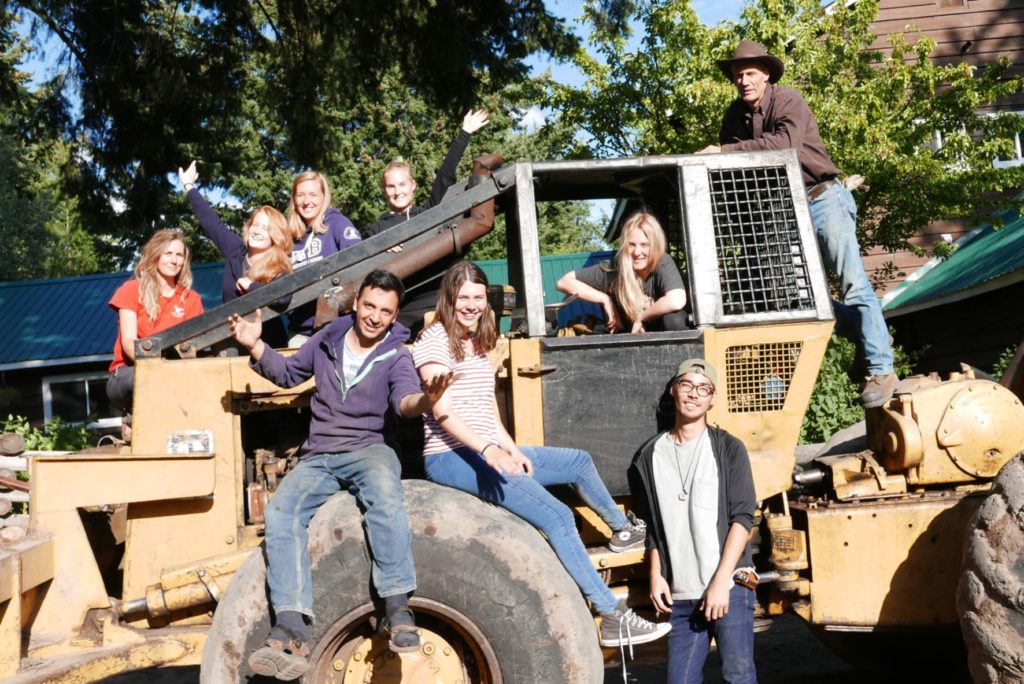Parallels between the Trails to Empowerment Community and Matriarchal Societies

Summary: The Trails to Empowerment community has a unique culture. To explain the differences between our community and most of society, we explore the concepts of patriarchy and matriarchy and identify how Trails to Empowerment’s egalitarian culture can be compared to a matriarchal society. This blog story will explain how we support each other on our transformational journeys, as we grow as leaders and mentors, how everybody has the opportunity to take on these roles, as much as they take responsibility and initiative to do so.
Our community is based on its own social structure which has been developed over the last 30 years. A principle we have is that the ranch is “run by capable, independent, self-reliant women and men who are secure enough to work with them”. This makes it clear the women at the ranch are empowered and have the opportunity to do everything. As do the men, but both have to be responsible and take initiative to make these opportunities happen, as well as be open minded to the fact that the Trails to Empowerment community operates on different principles to much of society. The business set up, its principles, values and the Three Pillar philosophy of nature connection, nature conservation and personal development is what makes this unique community culture happen. Still, some visitors to the ranch who hear about “all the women running the show” assume there must be “cat fights” all the time. But by looking at the differences between the ranch community and social norms, you will understand why we have this supportive environment in which women are empowered and take charge (and no cat fights!).
We’ll define two terms that can be used to illustrate society and our differences.
Most people today live in a patriarchy, where men hold primary power and dominate in roles of political leadership, moral authority, social privilege and control of property. This can be defined as power over others. Though society is making changes towards creating more equality between men and women, the social norms and customs society has internalized and which is practised unconsciously, are influenced by patriarchal structures.
A common misconception is that matriarchy is the opposite of patriarchy (Goettner-Abendroth, 2009). Many people believe that matriarchy means that women have all the power and men are oppressed, but this is only a reflection of the world seen from a patriarchal viewpoint. A matriarchy is where women are generally in charge, but with the respect and honour of the differences between the genders instead of using them for hierarchies, this means men and women both have important roles in the society and can take on leadership positions (Goettner-Abendroth, 2009). It is based on complementary equality to provide a balance between instinct and intellect, receptivity and assertiveness, collaboration and individualism, empathy and objectivity, what are often seen as opposite or mutually exclusive female and male traits. In a matriarchal system, power comes from within and is used to guide others, it isn’t an external force used to rule over others.
To many people, a matriarchal system is a nice fantasy based on Utopian ideals, but there are examples around the world of both human societies and animals species that thrive in matriarchal systems. The most common example of matriarchy is elephants, but did you know orcas and horses are also matriarchal? Modern human societies from Kenya to China, Indonesia to Alabama, US all have matriarchal communities (Marsden, 2018; Goettner-Abendroth, 2009). The Scythian people, from whom the Ancient Greeks based their legends of the Amazonian warriors (Marsden, 2018), were also a matriarchal people, where men and women both rode horses and fought in wars.
So, now we know the difference between patriarchy and matriarchy, and that matriarchy isn’t just a fantasy, what does it have to do with the Trails to Empowerment community? Lets take a look at some of the principles of the community philosophy and how these are similar to those of the matriarchal system.
In our ranch community power comes from within, this is called authentic power in Spiritual Partnership, by Gary Zukav. We have no hierarchy and live in an egalitarian community, which means trying to wield power over others (external power, as defined by Gary Zukav) serves no purpose. In a community we have no “men’s” or “women’s” roles. Everyone has the opportunity to get involved in everything – cooking, welding, guiding, cleaning, office, ranch maintenance, management – as much as they take initiative and responsibility to do so. Everyone is an equal, no matter their gender. As such, self-esteem and value comes from within and isn’t dependent on approval from others, the acquisition of a new title such as manager or succeeding where someone else has failed. This aligns with the matriarchal principle that power comes from within and is used to guide, not rule over, others. Equality, between individuals and between genders, is essential for a successful matriarchal society.
In our community, everyone steps up to the role of leader – when they are at the right stage of their transformational journey to do so – and this will happen sooner for those who take more ownership, responsibility and initiative, which are our leadership principles. In Brené Brown’s book, Daring Greatly, she talks about the importance of vulnerability in leadership. It is easier to be vulnerable (which Brené Brown defines as uncertainty, risk and emotional exposure) in the Trails to Empowerment community as every person knows they will be supported for trying something new, not ridiculed as is often the case in society. In the moment a decision needs to be made, someone will step up and take charge, but ensuring it is a collaborative effort to get to the solution. Matriarchal elephants have no self-appointed leader, instead she is often the “grandma elephant”, her experience is what makes her the leader, she knows how to handle tough situations and guide her family to safety.
Removing patriarchal norms from our ranch community, women that step up to take on the role of leader are supported by the men and women of the community. In patriarchal societies, women who take on leadership roles are often marginalized by other women who see them as breaking patriarchal norms, and taking on a role that is only for men. In our community, we invest in our personal growth and support each other to do the same, inline with Gary Zukav’s spiritual partner concept. This means that when women (and men) grow and evolve to take on leadership roles, we support them. A true community is where every individual success is a shared success. We also aren’t restricted by scarcity, the fear that if one person takes on a leadership role, the other people will never have this opportunity. One person will lead now, but next time it will be someone else who steps up to the plate. This is similar to the lead mare principles of horses. When a herd is big enough, a group of the most experienced mares will take turns being the lead mare.
We are not only leaders, everyone is also a mentor at one point, and a mentee the next. When one person learns a new skill or progresses to a new level of personal development on their transformational journey, it is their responsibility to share this with the rest of the community. In this way, everyone benefits from the experience. Those who are mentored learn new skills which help them grow and evolve. The mentor practices their leadership skills and reinforces their own lesson through teaching. In patriarchal societies, women are often very reluctant to share their knowledge with other women. This is based on the fear that if they share their knowledge, they will lose their special advantage over other women.
In the Trails to Empowerment community, the women and men here are empowered, support each other and experience autonomy. Studies have found women living in matriarchal systems have better health and happiness than women in patriarchal systems (Hendricks, 2021). We see this at the ranch, but living close to nature can also create this benefit.
Nature connection and nature conservation are two of our Three Pillars in the ranch community. Living close to nature has long been known to provide health benefits. As we experience all these benefits from nature, we know it is our responsibility to look after it. Matriarchal societies emphasize the importance of nature and taking responsibility to conserve it.
Collaboration is central to the success of our community. Interdependence and synergy create the concept that the “whole is greater than the sum of its parts”. Working together means we value collaboration over competition and allows us to contribute to and take responsibility for our community environment as well as the natural environment.
What type of men are attracted to life in this egalitarian, supportive ranch community? Eckhart Tolle describes the “death of the ego” in his books, The Power of Now and A New Earth to allow people to access Being and spiritual growth. This concept is clear in the Trails to Empowerment community. Men who come to the ranch with a big ego demonstrate to everyone else that ego gets in the way of an egalitarian society, they are offended and angered when given guidance by women, they are too proud to admit that they don’t know something. Men who can work side by side as equals with women, admit to making mistakes and learn from them are the men who thrive in our ranch community.
Conclusion:
In today’s society patriarchal norms are enforced through unconscious biases that have been internalized. But the need for a society based on matriarchal values which foster peaceful and egalitarian norms, authentic power from within and a high ethical level of interaction and relationship with nature is great.
The ranch community is free from patriarchal norms, eliminating “cat fights”, competition and hostilities. Instead, the norms, values and principles we embrace facilitate equality and collaboration. Women within our community are empowered to be the master of their own destiny and to take charge of it.
Being part of the ranch community, you will meet women that truly believe it’s their duty to mentor other women. The men here are aware that women can surpass them without having wronged them, which is often not the case in patriarchal societies. This experience will facilitate you the opportunity to rethink all you have internalized about what a society must look like and will unravel your unconscious biases based on patriarchal norms.
Lea and Charlie
Sources
Brown, Brené (2012) Daring Greatly: How the Courage to be Vulnerable Transforms the Way we Live, Love, Parent and Lead. Penguin Publishing Group, New York.
Goettner-Abendroth, Heide (2009) Societies of Peace: Matriarchies Past, Present and Future. Inanna Publications and Education Inc, Toronto.
Hendricks, Scotty (2021) Why living in a matriarchal society is better for women’s health. Available at: https://www.weforum.org/agenda/2021/02/women-matriarchal-society-improved-health-partriarchy/
Marsden, Harriet (2018) International Women’s Day: What are matriarchies and where are they now? Available at: https://www.independent.co.uk/news/long_reads/international-womens-day-matriarchy-matriarchal-society-women-feminism-culture-matrilineal-elephant-bonobo-a8243046.html
Tolle, Eckhart (1997) The Power of Now: A guide to spiritual enlightenment. Namaste Publishing, Vancouver.
Tolle, Eckhart (2005) A New Earth: Awakening to your life’s purpose. Penguin Books, New York.
Zukav, Gary (2010) Spiritual Partnership: The journey to authentic power. Harper One



